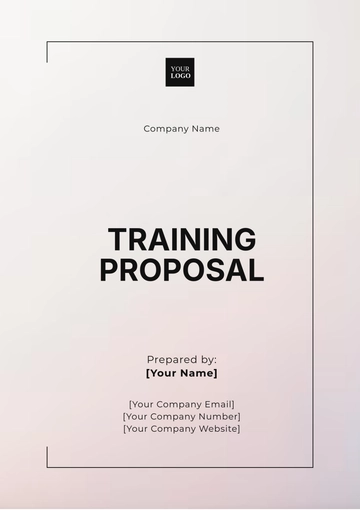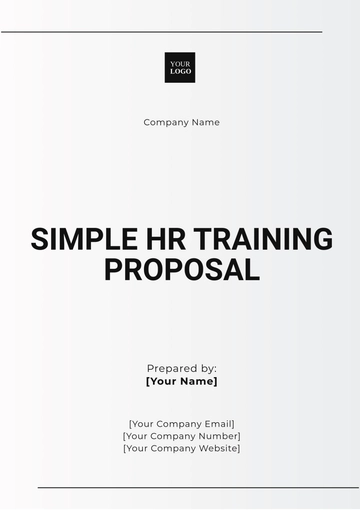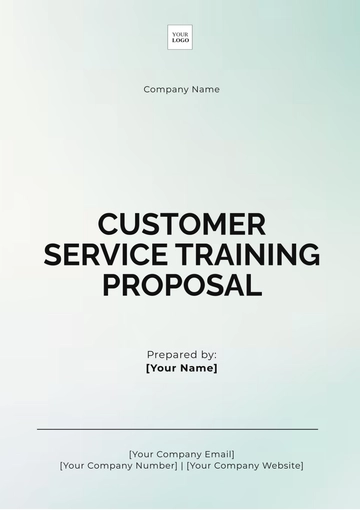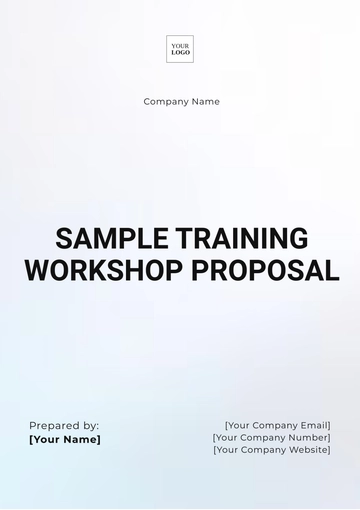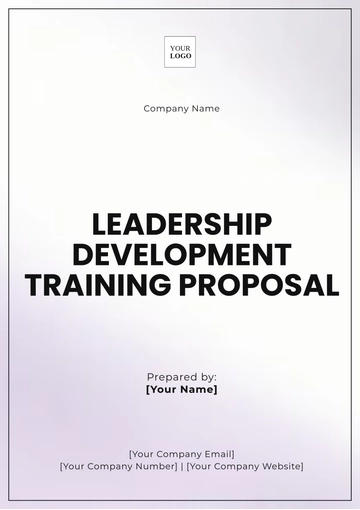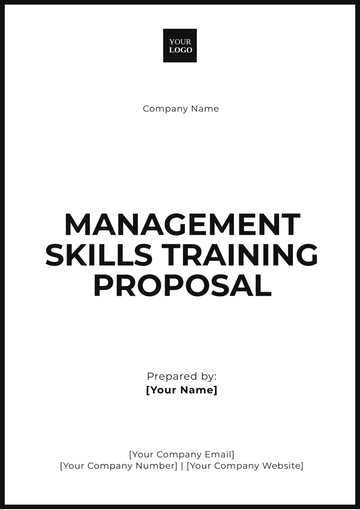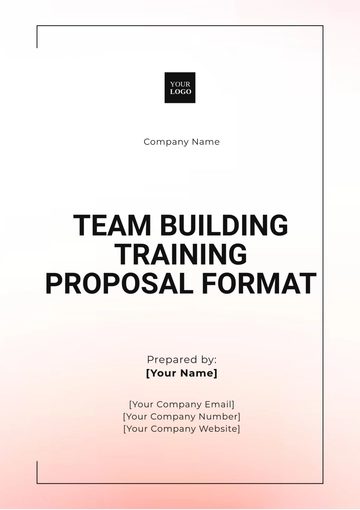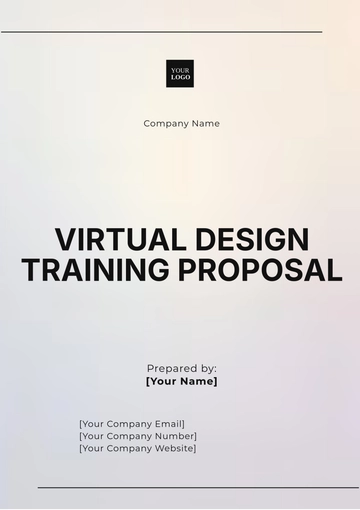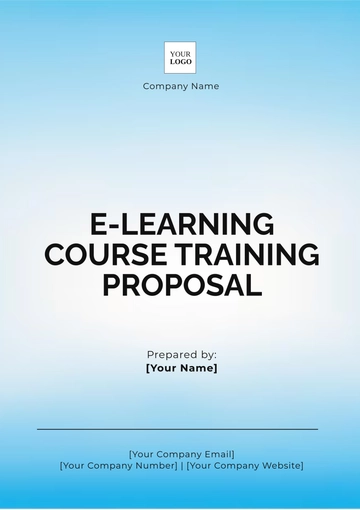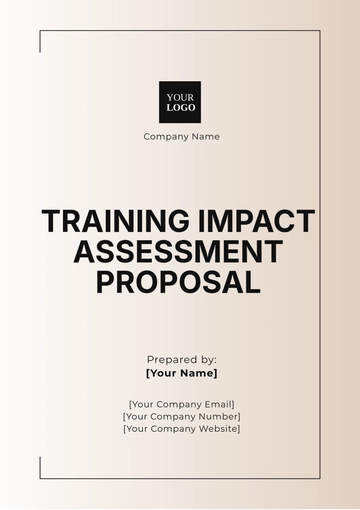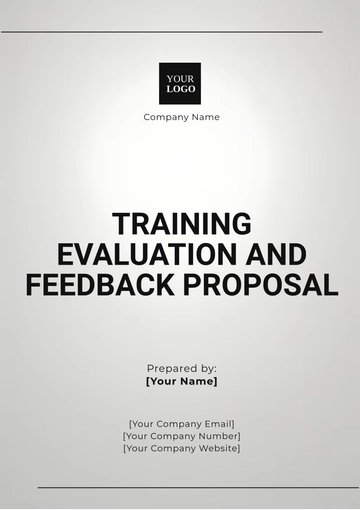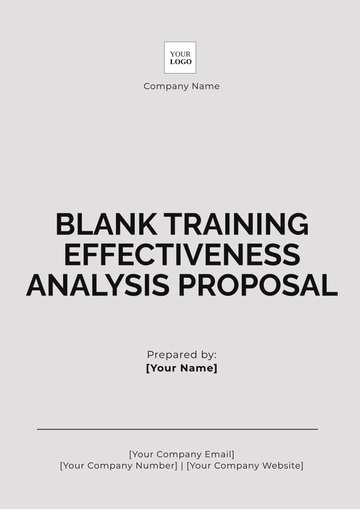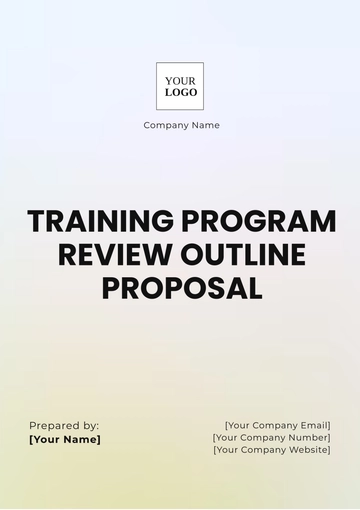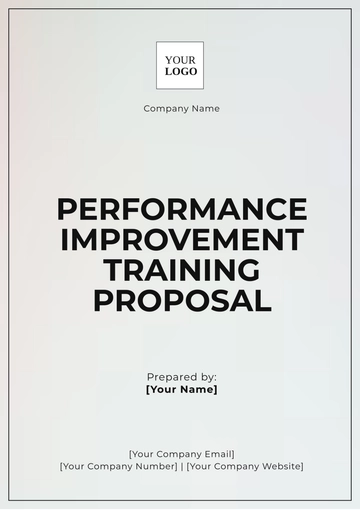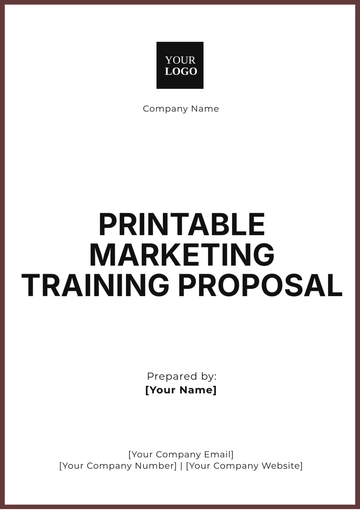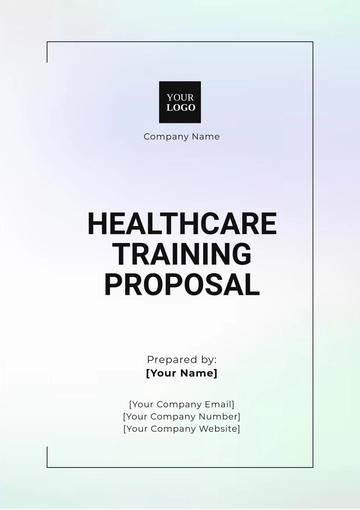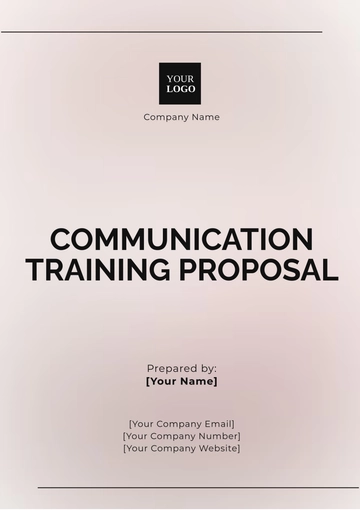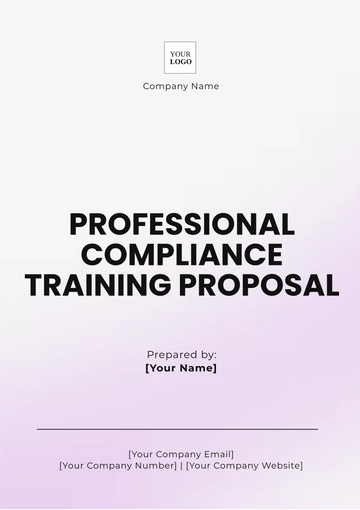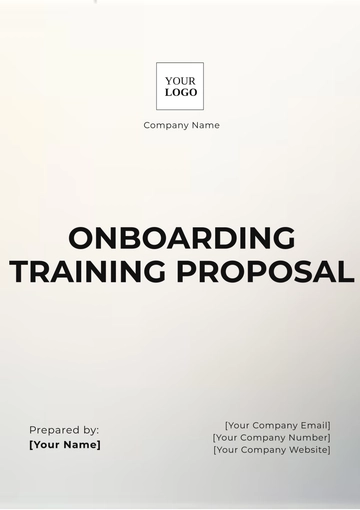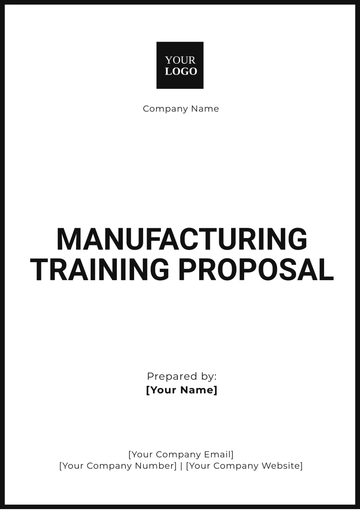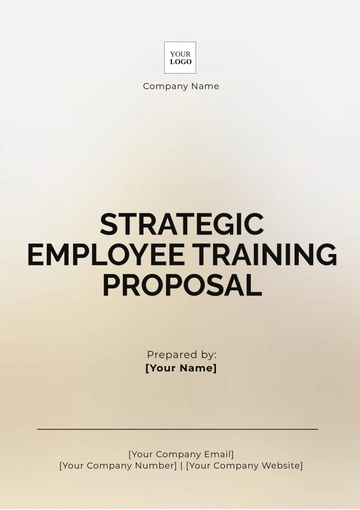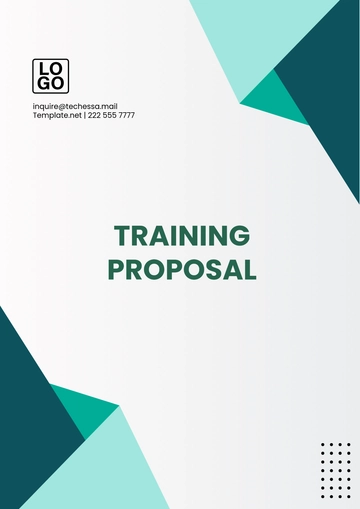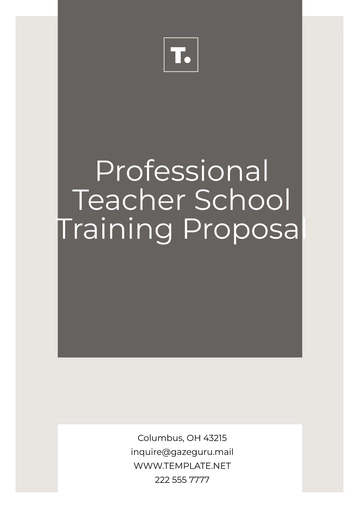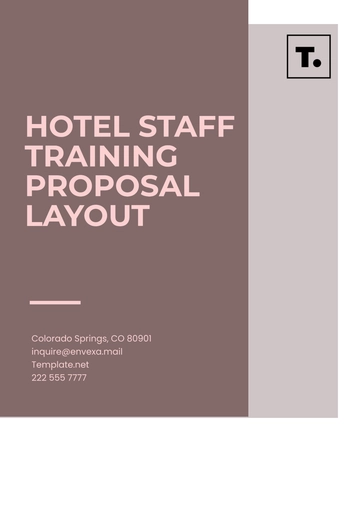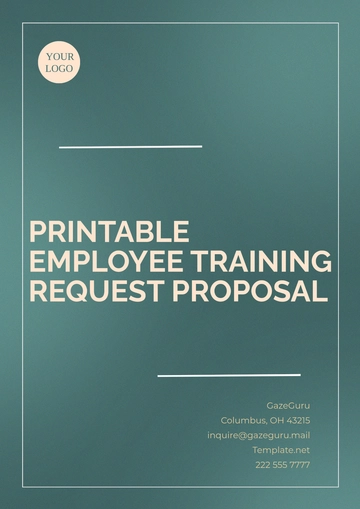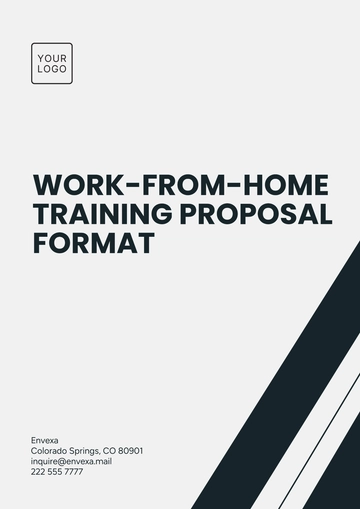Free Car Rental Training Proposal
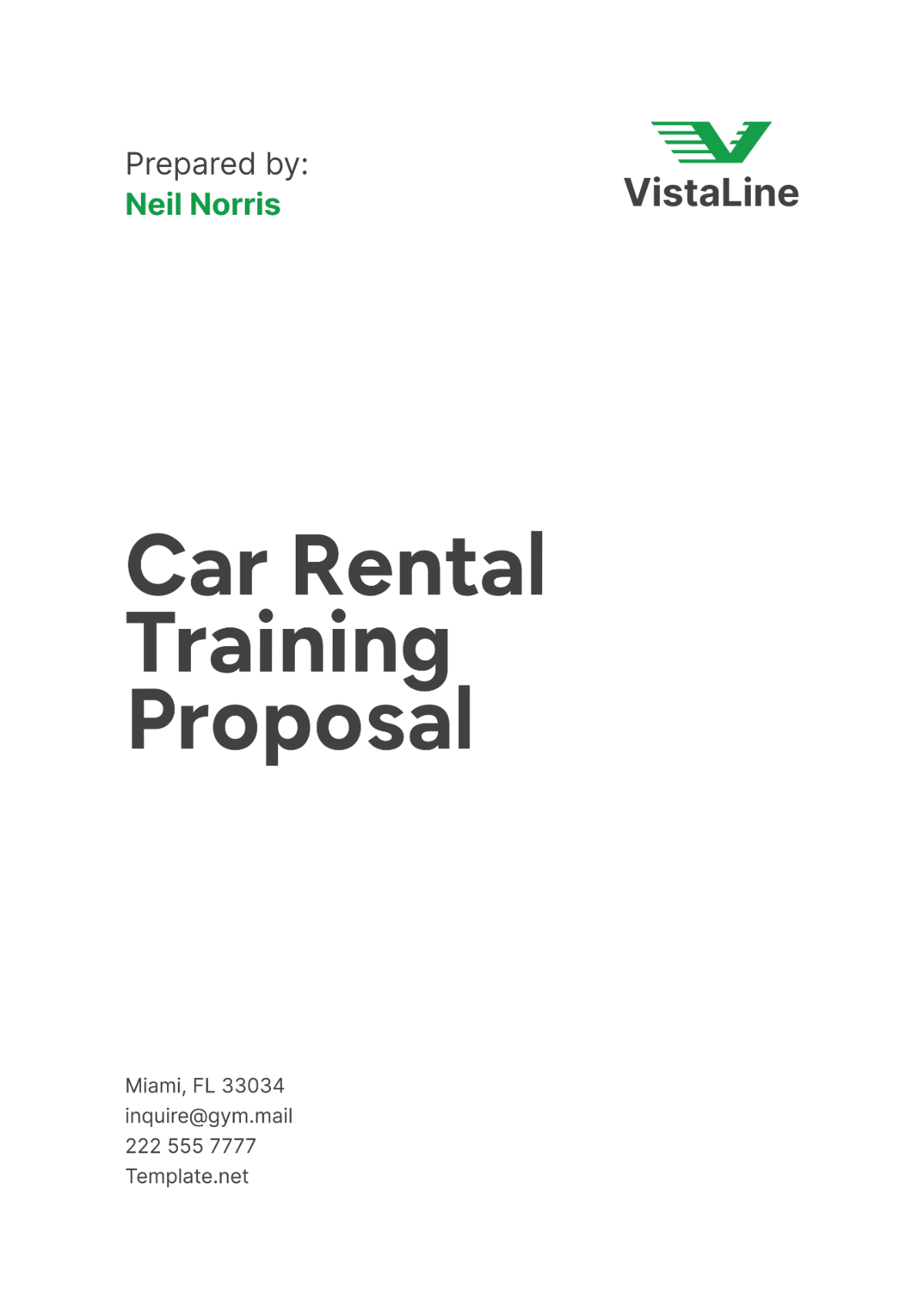
I. Executive Summary
The purpose of this proposal is to outline an effective training program for [Your Company Name], aiming to enhance employee skills, improve customer service, and boost overall operational efficiency. The proposed training program is structured to cover various aspects essential for the smooth functioning of a car rental business, including customer service, fleet management, sales techniques, and safety protocols. The total budget allocated for this training program is $50,000. The implementation timeline spans three months, starting from July 2050 to September 2050.
The training program is designed to address the specific needs of different departments within the company. By providing targeted training sessions, we aim to ensure that employees are well-equipped with the necessary knowledge and skills to perform their roles effectively. The program will include a mix of in-person workshops, online modules, and hands-on practice sessions to cater to various learning preferences and schedules.
The expected outcomes of this training program include increased customer satisfaction, improved employee performance, and higher operational efficiency. By investing in our employees' development, we anticipate a positive impact on our overall business performance, leading to higher revenue and customer retention rates. This proposal outlines the detailed structure, content, and budget of the training program to ensure its successful implementation and achievement of the desired outcomes.
II. Training Objectives
A. Improve Customer Service Skills
Enhance Communication: Employees will learn effective communication techniques to better understand and respond to customer needs. This includes active listening, empathy, and clarity in conveying information.
Resolve Conflicts: Training will focus on conflict resolution strategies to handle difficult situations with customers professionally and calmly. Employees will be equipped with tools to de-escalate tense situations.
Boost Satisfaction: Emphasis will be placed on creating positive customer experiences through personalized service and attention to detail. Techniques to exceed customer expectations will be highlighted.
Build Relationships: Developing long-term customer relationships through trust and reliability will be a key focus. Employees will learn strategies to foster customer loyalty and repeat business.
Feedback Utilization: Training will include methods for collecting and utilizing customer feedback to continuously improve service quality and address any issues promptly.
B. Enhance Fleet Management
Efficient Scheduling: Employees will learn best practices for scheduling vehicle maintenance and rentals to maximize fleet utilization. This includes understanding peak demand periods and maintenance cycles.
Inventory Control: Training will cover techniques for effective inventory management, ensuring the availability of vehicles and parts when needed. This helps in reducing downtime and improving service availability.
Maintenance Protocols: Detailed training on vehicle maintenance procedures to ensure safety and reliability. This includes preventive maintenance, regular inspections, and handling repairs efficiently.
Data Analysis: Utilizing data analytics to track fleet performance and identify areas for improvement. Employees will learn to interpret data and make informed decisions to optimize operations.
C. Improve Sales Techniques
Product Knowledge: Comprehensive training on the features and benefits of different vehicle models available for rent. Employees will be able to confidently explain options to customers.
Upselling Strategies: Techniques for upselling additional services and products, such as insurance, GPS, and car seats, to increase revenue. Training will focus on identifying customer needs and matching them with appropriate offerings.
Negotiation Skills: Effective negotiation techniques to close deals while ensuring customer satisfaction. Employees will learn how to handle objections and find mutually beneficial solutions.
Customer Retention: Strategies to retain customers and encourage repeat business. This includes follow-up communication, loyalty programs, and personalized offers.
D. Implement Safety Protocols
Health and Safety Guidelines: Training on the latest health and safety guidelines, including COVID-19 protocols, to ensure the safety of employees and customers.
Emergency Procedures: Detailed procedures for handling emergencies such as accidents, vehicle breakdowns, and natural disasters. Employees will learn the appropriate steps to take in various scenarios.
Risk Management: Identifying and mitigating potential risks in daily operations. Training will cover risk assessment techniques and implementation of preventive measures.
Compliance Training: Ensuring compliance with local and federal regulations related to vehicle rental and safety standards. Employees will be updated on any regulatory changes and their implications.
III. Training Program Structure
A. In-Person Workshops
The following table provides a schedule of in-person workshops:
Date | Topic | Duration | Location |
|---|---|---|---|
July 5, 2050 | Customer Service Skills | 8 hours | Main Office |
July 12, 2050 | Fleet Management | 6 hours | Fleet Maintenance HQ |
July 19, 2050 | Sales Techniques | 8 hours | Sales Office |
July 26, 2050 | Safety Protocols | 6 hours | Safety Training Center |
Customer Service Skills Workshop: Scheduled for July 5, 2050, this 8-hour workshop will focus on enhancing communication, conflict resolution, and customer relationship-building skills. Held at the Main Office, it aims to equip employees with tools to improve customer interactions and satisfaction.
Fleet Management Workshop: Taking place on July 12, 2050, this 6-hour session at the Fleet Maintenance HQ will cover efficient scheduling, inventory control, and maintenance protocols. Employees will learn best practices for optimizing fleet utilization and minimizing downtime.
Sales Techniques Workshop: Set for July 19, 2050, at the Sales Office, this 8-hour workshop will delve into product knowledge, upselling strategies, and negotiation skills. The goal is to boost sales performance and revenue through effective selling techniques.
Safety Protocols Workshop: On July 26, 2050, this 6-hour workshop at the Safety Training Center will focus on health and safety guidelines, emergency procedures, and compliance training. Employees will be trained on maintaining a safe environment for both staff and customers.
In-person workshops provide an interactive learning experience, allowing employees to engage in discussions, role-playing, and hands-on practice. These sessions are crucial for reinforcing theoretical knowledge with practical applications.
B. Online Modules
The following table outlines the schedule for online training modules:
Start Date | Topic | Duration |
|---|---|---|
August 1, 2050 | Customer Service Skills | 4 weeks |
August 15, 2050 | Fleet Management | 4 weeks |
September 1, 2050 | Sales Techniques | 4 weeks |
September 15, 2050 | Safety Protocols | 4 weeks |
Customer Service Skills Module: Starting on August 1, 2050, this 4-week online module will cover communication, conflict resolution, and customer relationship-building skills. The Online Learning Portal provides flexibility for employees to learn at their own pace.
Fleet Management Module: Beginning on August 15, 2050, this 4-week module focuses on scheduling, inventory control, and maintenance protocols. The online format allows employees to access training materials and assessments conveniently.
Sales Techniques Module: Commencing on September 1, 2050, this 4-week module covers product knowledge, upselling strategies, and negotiation skills. Employees can engage with interactive content and quizzes to reinforce learning.
Safety Protocols Module: Starting on September 15, 2050, this 4-week online module includes health and safety guidelines, emergency procedures, and compliance training. The flexible schedule accommodates diverse learning needs.
Online modules complement in-person workshops by providing continuous learning opportunities. They allow employees to revisit concepts and complete training at their convenience, ensuring comprehensive understanding.
IV. Training Content and Curriculum
A. Customer Service Training
The following table outlines the key topics and content for customer service training:
Topic | Description | Duration |
|---|---|---|
Effective Communication | Techniques for clear and empathetic communication | 2 hours |
Conflict Resolution | Strategies for resolving customer disputes | 2 hours |
Creating Positive Experiences | Methods to exceed customer expectations | 2 hours |
Building Customer Relationships | Techniques for fostering long-term customer loyalty | 2 hours |
Effective Communication: This 2-hour session covers techniques for clear and empathetic communication. Employees will learn how to listen actively, express themselves clearly, and understand customer needs.
Conflict Resolution: In this session, employees will be trained on strategies for resolving customer disputes. They will learn to handle difficult situations calmly and professionally, aiming to find mutually satisfactory solutions.
Creating Positive Experiences: This session focuses on methods to exceed customer expectations. Employees will learn how to provide personalized service and pay attention to details that enhance customer satisfaction.
Building Customer Relationships: In this 2-hour session, employees will learn techniques for fostering long-term customer loyalty. This includes building trust, being reliable, and following up with customers to maintain positive relationships.
Providing comprehensive customer service training is essential for creating positive customer experiences and fostering long-term loyalty. By equipping employees with these skills, we can enhance our reputation and customer satisfaction levels.
B. Fleet Management Training
The following table outlines the key topics and content for fleet management training:
Topic | Description | Duration |
|---|---|---|
Efficient Scheduling | Best practices for vehicle maintenance and rentals | 2 hours |
Inventory Control | Techniques for managing vehicle and part inventory | 2 hours |
Maintenance Protocols | Procedures for vehicle maintenance and repairs | 2 hours |
Data Analysis | Using data analytics to optimize fleet performance | 2 hours |
Efficient Scheduling: This 2-hour session covers best practices for vehicle maintenance and rental scheduling. Employees will learn how to manage peak demand periods and ensure timely maintenance.
Inventory Control: In this session, employees will be trained on techniques for managing vehicle and part inventory. They will learn how to maintain optimal inventory levels and reduce downtime.
Maintenance Protocols: This session focuses on procedures for vehicle maintenance and repairs. Employees will learn preventive maintenance techniques and how to handle repairs efficiently.
Data Analysis: In this session, employees will learn to use data analytics to optimize fleet performance. They will be trained on interpreting data and making informed decisions to improve operations.
Effective fleet management training ensures that our vehicles are well-maintained, available when needed, and utilized efficiently. By optimizing fleet performance, we can reduce costs and improve service reliability.
C. Sales Techniques
The following table outlines the key topics and content for sales techniques training:
Topic | Description | Duration |
|---|---|---|
Product Knowledge | Comprehensive understanding of vehicle models and features | 2 hours |
Upselling Strategies | Techniques for upselling additional services and products | 2 hours |
Negotiation Skills | Effective negotiation techniques for closing deals | 2 hours |
Customer Retention | Strategies for retaining customers and encouraging repeat business | 2 hours |
Product Knowledge: This 2-hour session covers a comprehensive understanding of different vehicle models and their features. Employees will learn how to confidently explain options to customers and match them with their needs.
Upselling Strategies: In this session, employees will be trained on techniques for upselling additional services and products. This includes identifying customer needs and offering appropriate add-ons such as insurance and GPS.
Negotiation Skills: This session focuses on effective negotiation techniques for closing deals. Employees will learn how to handle objections, find mutually beneficial solutions, and ensure customer satisfaction.
Customer Retention: In this 2-hour session, employees will learn strategies for retaining customers and encouraging repeat business. This includes follow-up communication, loyalty programs, and personalized offers.
Improving sales techniques is crucial for increasing revenue and enhancing customer satisfaction. By equipping employees with advanced sales skills, we can boost overall business performance.
D. Safety Protocols
The following table outlines the key topics and content for safety protocols training:
Topic | Description | Duration |
|---|---|---|
Health and Safety Guidelines | Latest health and safety guidelines | 2 hours |
Emergency Procedures | Detailed procedures for handling emergencies | 2 hours |
Risk Management | Identifying and mitigating potential risks | 2 hours |
Compliance Training | Ensuring compliance with local and federal regulations | 2 hours |
Health and Safety Guidelines: This session covers the latest health and safety guidelines. Employees will learn how to maintain a safe environment for both staff and customers.
Emergency Procedures: In this 2-hour session, employees will be trained on detailed procedures for handling emergencies such as accidents and vehicle breakdowns. They will learn the appropriate steps to take in various scenarios.
Risk Management: This session focuses on identifying and mitigating potential risks in daily operations. Employees will learn risk assessment techniques and the implementation of preventive measures.
Compliance Training: In this session, employees will be updated on local and federal regulations related to vehicle rental and safety standards. They will learn about any regulatory changes and their implications.
Implementing robust safety protocols is essential for ensuring the well-being of both employees and customers. By training employees on these protocols, we can minimize risks and maintain compliance with regulatory standards.
By covering these key areas—customer service, fleet management, sales techniques, and safety protocols—we can ensure that our employees are well-rounded and proficient in all aspects of their roles. This comprehensive approach to training will drive improved performance and business success.
V. Training Budget
The following chart and table outline the budget allocation for the training program:
Item | Cost | Description |
|---|---|---|
In-Person Workshops | $20,000 | Venue, materials, and facilitator fees |
Online Modules | $15,000 | Platform subscription and content creation |
Training Materials | $5,000 | Manuals, guides, and supplementary resources |
Employee Stipends | $10,000 | Compensation for time spent in training |
Total | $50,000 |
A. In-Person Workshops
The cost for in-person workshops is $20,000, covering venue rental, training materials, and facilitator fees. These workshops provide interactive and practical learning experiences.
B. Online Modules
The budget for online modules is $15,000, including platform subscription and content creation. Online modules offer flexibility and continuous learning opportunities.
C. Training Materials
Allocated $5,000 for training materials such as manuals, guides, and supplementary resources. These materials support the training sessions and provide reference for employees.
D. Employee Stipends
A budget of $10,000 is allocated for employee stipends, compensating employees for their time spent in training. This ensures that employees are motivated to participate fully in the program.
Investing in a comprehensive training program with a well-defined budget is crucial for enhancing employee skills and improving overall operational efficiency. By allocating resources effectively, we can achieve the desired outcomes.
VI. Evaluation and Feedback
A. Pre-Training Assessment
Skill Assessment: Conduct a pre-training assessment to evaluate employees' current skills and knowledge levels. This will help in identifying areas that need improvement and tailoring the training program accordingly.
Feedback Collection: Gather feedback from employees on their expectations and training needs. This will ensure that the training program addresses their concerns and meets their requirements.
Baseline Metrics: We will use baseline metrics to measure the effectiveness of the training program. This includes customer satisfaction scores, sales performance, and fleet utilization rates.
Goal Setting: Set clear and achievable goals for the training program. These goals will guide the training process and provide a benchmark for evaluating success.
B. Post-Training Evaluation
Skill Improvement: Conduct a post-training assessment to evaluate the improvement in employees' skills and knowledge levels. Compare the results with the pre-training assessment to measure progress.
Employee Feedback: Collect feedback from employees on the effectiveness of the training program. This will help in identifying areas for improvement and making necessary adjustments for future training sessions.
Performance Metrics: Analyze performance metrics such as customer satisfaction scores, sales performance, and fleet utilization rates. Compare these metrics with the baseline to assess the impact of the training program.
Continuous Improvement: Use the insights from the post-training evaluation to continuously improve the training program. This ensures that the training program remains relevant and effective in addressing the company's needs.
A thorough evaluation and feedback process is essential for measuring the success of the training program and identifying areas for improvement. By continuously refining the program, we can ensure that it meets the evolving needs of the company and employees.
VII. Conclusion
This Training Proposal of [Your Company Name] aims to enhance employee skills, improve customer service, and boost operational efficiency. By implementing a comprehensive training program, we can ensure that employees are well-equipped to perform their roles effectively, leading to increased customer satisfaction and business growth.
The proposed training program, with a total budget of $50,000 and a three-month implementation timeline, covers various aspects essential for the smooth functioning of a car rental business. By continuously evaluating and improving the training program, we can achieve the desired outcomes and maintain a competitive edge in the industry.
- 100% Customizable, free editor
- Access 1 Million+ Templates, photo’s & graphics
- Download or share as a template
- Click and replace photos, graphics, text, backgrounds
- Resize, crop, AI write & more
- Access advanced editor
Develop an effective training program with our Car Rental Training Proposal Template on Template.net! This template offers a comprehensive layout for proposing training initiatives. It is fully editable and customizable, allowing you to adapt the content to different training needs and objectives. Generate effortlessly using the integrated AI Editor Tool!
You may also like
- Business Proposal
- Research Proposal
- Proposal Request
- Project Proposal
- Grant Proposal
- Photography Proposal
- Job Proposal
- Budget Proposal
- Marketing Proposal
- Branding Proposal
- Advertising Proposal
- Sales Proposal
- Startup Proposal
- Event Proposal
- Creative Proposal
- Restaurant Proposal
- Blank Proposal
- One Page Proposal
- Proposal Report
- IT Proposal
- Non Profit Proposal
- Training Proposal
- Construction Proposal
- School Proposal
- Cleaning Proposal
- Contract Proposal
- HR Proposal
- Travel Agency Proposal
- Small Business Proposal
- Investment Proposal
- Bid Proposal
- Retail Business Proposal
- Sponsorship Proposal
- Academic Proposal
- Partnership Proposal
- Work Proposal
- Agency Proposal
- University Proposal
- Accounting Proposal
- Real Estate Proposal
- Hotel Proposal
- Product Proposal
- Advertising Agency Proposal
- Development Proposal
- Loan Proposal
- Website Proposal
- Nursing Home Proposal
- Financial Proposal
- Salon Proposal
- Freelancer Proposal
- Funding Proposal
- Work from Home Proposal
- Company Proposal
- Consulting Proposal
- Educational Proposal
- Construction Bid Proposal
- Interior Design Proposal
- New Product Proposal
- Sports Proposal
- Corporate Proposal
- Food Proposal
- Property Proposal
- Maintenance Proposal
- Purchase Proposal
- Rental Proposal
- Recruitment Proposal
- Social Media Proposal
- Travel Proposal
- Trip Proposal
- Software Proposal
- Conference Proposal
- Graphic Design Proposal
- Law Firm Proposal
- Medical Proposal
- Music Proposal
- Pricing Proposal
- SEO Proposal
- Strategy Proposal
- Technical Proposal
- Coaching Proposal
- Ecommerce Proposal
- Fundraising Proposal
- Landscaping Proposal
- Charity Proposal
- Contractor Proposal
- Exhibition Proposal
- Art Proposal
- Mobile Proposal
- Equipment Proposal
- Student Proposal
- Engineering Proposal
- Business Proposal
